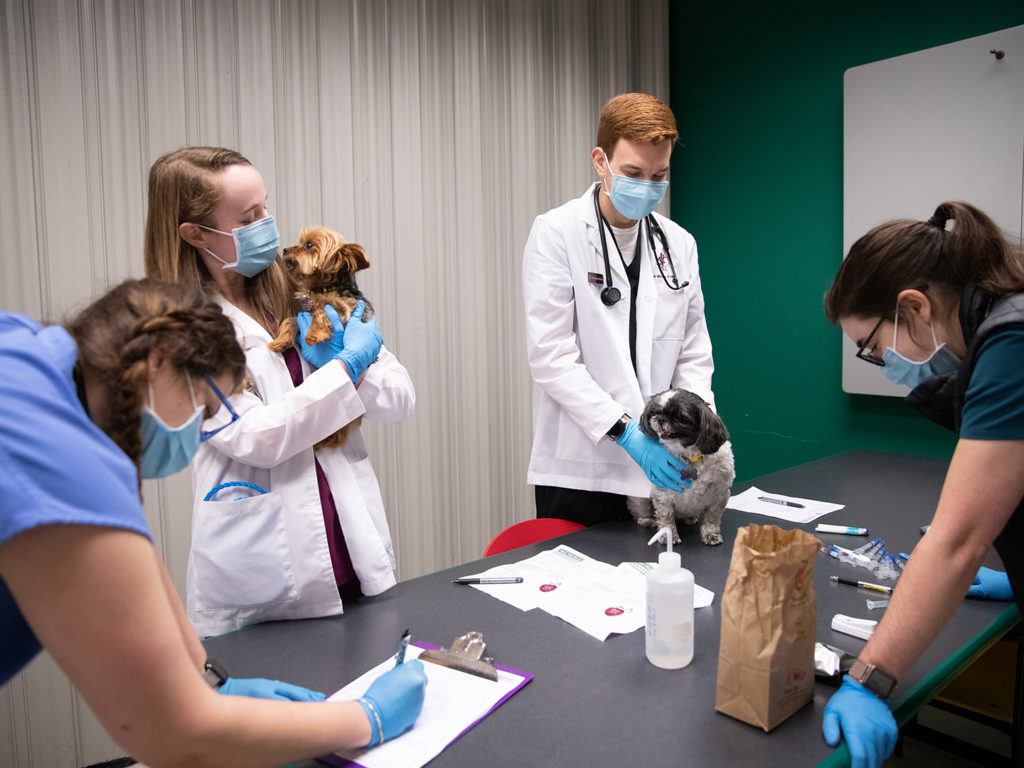- September 27, 2022
- No Comment
- 6 minutes read
Texas A&M Students Bring Veterinary Medicine To Underserved Members Of Campus Community – Texas A&M University Today

For as long as she can remember, recent biomedical sciences graduate Emma Bender ’22 has loved animals and desired to become a veterinarian. When she discovered a passion for community service as well, she decided to dedicate her career to serving both people and animals.
While volunteering at a service event for the Texas A&M student organization Ags REACH, she had an idea that would allow her to start achieving her goals while still a student.
Bender recalled that members of her local community had reduced access to veterinary care for their pets and came up with a way to make a difference.
“I was having a conversation about a health fair we were planning for our essential Aggies, when I started thinking it would be really cool if we could take care of their pets as well,” the Plano native said.
Her dream became a reality when the Texas A&M School of Veterinary Medicine & Biomedical Sciences (VMBS) and the REACH project of Bryan partnered to host the REACH Pet Health Fair for Texas A&M’s essential workers.
During the recurring event, service workers from the Texas A&M campus are invited to bring their pets to a free pet wellness clinic that offers physical examinations, heartworm and fecal tests, heartworm prevention and vaccinations by VMBS veterinary students under faculty supervision.
The REACH (Respect Empowerment Aspiration Community Hope) Project is a nonprofit organization founded in 2017 by Texas A&M alumnus Max Gerall ’18 to support the university’s more than 3,000 contracted, third-party workers, including food service, custodial, grounds and maintenance employees, many of whom face daily struggles.
REACH provides these community members with health, education and housing resources, areas in which many of them feel gaps. The nonprofit regularly operates in partnership with Texas A&M-affiliated Ags REACH, which provides the manpower to help REACH achieve its goals.
Partnering with the VMBS, the REACH Pet Health Fair provides free services to the pets of essential workers who otherwise may not be able to access the same level of care.
One of the clients was Chanika Moses, a dietitian for Compass USA who works at Texas A&M, who brought her dog, Puppins, and cat, Noodles, for a checkup.
“It went very well and it was a great experience,” Moses said. “These pets are our support animals; my dog, especially, knows when we’re hurting, emotionally or physically, and she comes to snuggle with us. She tries to make us feel better in any way she can.
“They’re a very important part of our family and we try to take care of them as much as possible, but we want to do it at a low cost,” she said. “Going to the vet is very expensive, so this opportunity saved us a lot and we can redistribute that income toward things other than that dreaded vet bill.”
Moses plans to return for future pet health fairs and to other collaborations between REACH and the VMBS.
“It’s honestly amazing to see how many people we’re helping,” Bender said. “As I’ve been in contact with our essential Aggies, they are all just so grateful that we’re doing this for them. Seeing this unfold as something that I created is just incredible and, honestly, really hard to put into words.”
Finding fulfillment in community service was something Bender first experienced in high school while participating in summer mission trips for her church.
“We went to Crossville, Tennessee, every summer to serve the underprivileged and put on a Vacation Bible School-type event for the children,” she said. “Being able to interact with those kids and see how much they loved what we did for them was honestly more fulfilling than probably anything else I could ever do.”
Besides helping others, veterinary medicine is one of her other greatest passions in life.
“I’ve always wanted to be a vet. Literally since before I can remember, that’s all I’ve ever wanted to do,” she said. “Through high school, all of my opportunities shadowing veterinarians, and working at vet clinics, I have not changed my mind.”
While the world-renowned VMBS was Bender’s main motivation for attending Texas A&M, she was also attracted to the university’s focus on selfless service.
“It’s amazing because there are just so many opportunities for students to get involved in the community,” she said.
Bender is already planning for a future that combines her loves for veterinary medicine and community service. She envisions a career in which she can use her skills in small animal medicine to support local animal shelters and community members in need.
To read the full story, visit the School of Veterinary Medicine & Biomedical Sciences’ website.
This article by Megan Myers originally appeared in the Summer 2022 edition of CVMBS Today.
Team members continue to respond to animal field emergencies and care for animals at their base of operations in Eastland.
Texas A&M College of Veterinary Medicine & Biomedical Sciences researchers hope new methods will increase the number of young macaws.
The Veterinary Emergency Team provided care for more than 700 animals at its Raymondville clinic.
The award is named for the former U.S. senator who taught economics at Texas A&M.
With the goal of optimizing even the smallest job, the staff at this interdisciplinary research center strives to create safer, healthier ways of getting things done.
The new biweekly TV program invites viewers to explore behind-the-scene stories at the nation’s largest university.
Subscribe to the Texas A&M Today newsletter for the latest news and stories every week.

